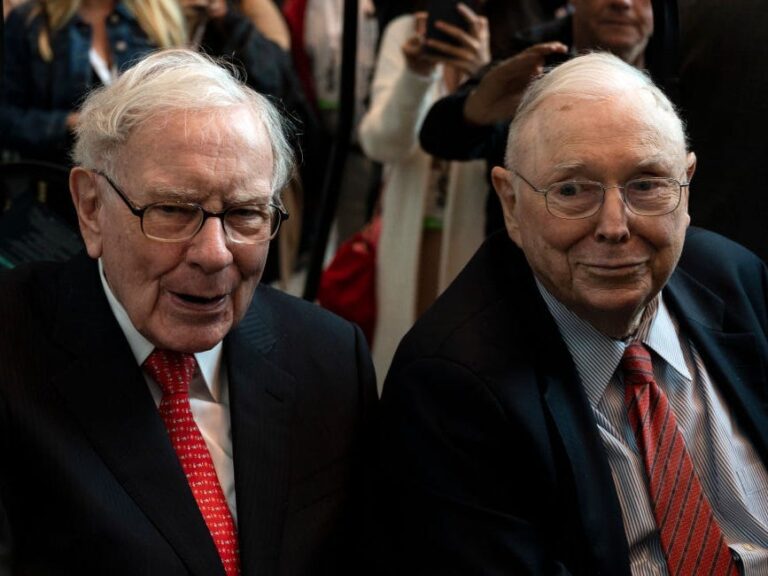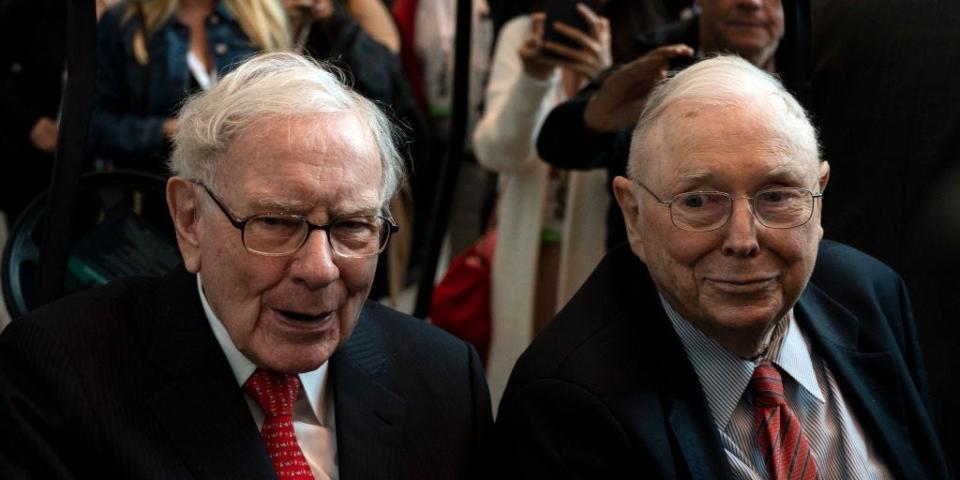
[ad_1]

-
Warren Buffett hailed Charlie Munger as the “architect” of Berkshire Hathaway in his annual letter.
-
The investor also called out stock-market gamblers who buy “hot stocks” and “lottery tickets.”
-
Buffett dismissed forecasters, warned Berkshire’s scale is a challenge, and nodded to the AI frenzy.
Warren Buffett paid tribute to Charlie Munger, touted four of Berkshire Hathaway’s biggest bets, and voiced frustration in his annual letter to shareholders published on Saturday.
The famed investor and Berkshire CEO also called out stock-market gamblers and speculators, dismissed Wall Street forecasters, and even nodded to the AI craze while championing his hometown of Omaha, Nebraska.
Munger, Buffett’s business partner and Berkshire’s vice chairman for over four decades, died in November at 99. He shaped Berkshire into a world-beating conglomerate and helped Buffett evolve from bargain hunting to buying businesses at fair prices.
“Though I have long been in charge of the construction crew; Charlie should forever be credited with being the architect,” Buffett said in his letter, describing himself as the “general contractor” who realized Munger’s vision.
Echoing last year’s letter, the centibillionaire hailed Berkshire’s large stakes in Coca-Cola and American Express, which it hasn’t touched in over two decades, as emblematic of his company’s long-term investing style.
Buffett also praised Occidental Petroleum, which he’s built a nearly 28% stake in from scratch within the last two years. He trumpeted the oil-and-gas explorer and producer for supporting US energy independence and pioneering carbon-capture methods.
He also shouted out Berkshire’s roughly 9% stakes in five Japanese trading houses, which he started amassing back in July 2019. He celebrated their restraint in compensating executives, their discipline in paying dividends, and their long-term, conservative management.
Buffett seemed resigned, however, that Berkshire has grown so big that there are few other directions for it to go.
The stockpicker explained that Berkshire is now so large — it had $561 billion of net assets at the end of December, more than any other American company — that it’s extremely hard to make purchases that are big enough to materially accelerate its growth.
“There remain only a handful of companies in this country capable of truly moving the needle at Berkshire, and they have been endlessly picked over by us and by others,” he said, adding there are virtually none outside the United States either.
“All in all, we have no possibility of eye-popping performance,” he said.
Buffett also criticized speculators in his letter, noting that stock traders are “neither more emotionally stable nor better taught” than when he was a student. He also noted the proliferation of stock-trading apps has made daily buying and selling easier than ever.
“Markets now exhibit far more casino-like behavior than they did when I was young,” he said. “The casino now resides in many homes and daily tempts the occupants.”
Along the same lines, Buffett said that he imagines Berkshire shareholders to be long-term holders, not people who use their spare cash to “purchase lottery tickets or ‘hot stocks.'”
Buffett also brushed off the army of experts predicting market crashes and recessions or giving stock tips on TV.
“Pundits should always be ignored,” he said, questioning why they would share their forecasts if they were certain they’d come true. “That would be like finding gold and then handing a map to the neighbors showing its location.”
Buffett also remarked that Omaha has produced himself and Munger; the heads of Berkshire’s insurance and non-insurance divisions, Ajit Jain and Greg Abel; and his sister, Bertie, who he described as “one of the country’s great investors.”
“So what is going on? Is it Omaha’s water? Is it Omaha’s air? Is it some strange planetary phenomenon akin to that which has produced Jamaica’s sprinters, Kenya’s marathon runners, or Russia’s chess experts? Must we wait until AI someday yields the answer to this puzzle?” he quipped.
Read the original article on Business Insider
[ad_2]